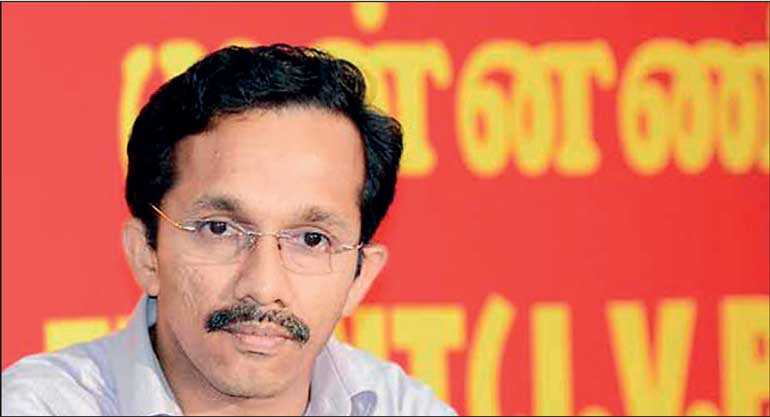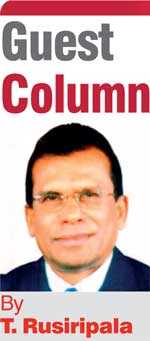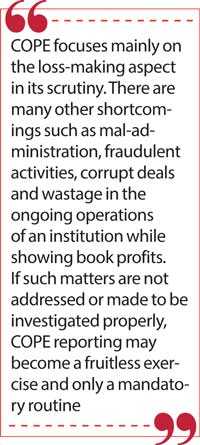Thursday Feb 19, 2026
Thursday Feb 19, 2026
Friday, 1 February 2019 00:00 - - {{hitsCtrl.values.hits}}

COPE Chairman Sunil Handunnetti has very candidly stated inter-alia in his seventh COPE report under the  Chairman’s Note as follows: “Whether the public will have confidence in COPE and in Parliament in general or not depends entirely on the trust that the public is able to establish based on our practice and our pragmatic actions.”
Chairman’s Note as follows: “Whether the public will have confidence in COPE and in Parliament in general or not depends entirely on the trust that the public is able to establish based on our practice and our pragmatic actions.”
While it is an admitted fact that the public have lost their confidence in Parliament in general, the trust they would place on the findings reported by the COPE depends on two factors. Firstly, the practice the COPE follows and secondly, the procedure and the action taken by the committee to address the salient issues in exercising the fiscal powers vested in the Parliament.
COPE with its limited time and application has to rely on the Auditor General’s report and centres its focus on the institutions mainly on the profitability criteria. Matters highlighted in the audit reports serve as the principal foundation for the disclosures made in the COPE reports. Needless to state that this procedure overlooks and ignores several other important and relevant factors that have to be addressed to determine the appropriate fiscal performance of a State enterprise.
Hence the conjecture of the COPE Chairman regarding public trust and confidence is justified to that extent. The question of whether the actions are pragmatic or evasive is a matter for the public to assess further.
Another escapade
Like many other happenings in the Parliament the outcome of the COPE findings has become another escapade. COPE reports published do not appear to disclose any new findings beyond what is given in the audit reports. Even remedial actions proposed where warranted, too, appear to be mere eyewash with no serious follow up or further monitoring.
COPE focuses mainly on the loss making aspect in its scrutiny. There are many other shortcomings such as mal-administration, fraudulent activities, corrupt deals and wastage in the ongoing operations of an institution while showing book profits. If such matters are not addressed or made to be investigated properly, COPE reporting may become a fruitless exercise and only a mandatory routine.
There was a time that assurances given on the floor of the House regarding the steps to be taken on COPE findings by those responsible to make such a response would be honoured. But now the situation is different. Some statements made by the Leader of the House who happens to be the main spokesman on behalf of the Government have simply evaporated into thin air with scanty follow-up action or as in some instances completely consigned to oblivion with callous disregard of the responsibility. 
The irregularities or the violations disclosed continue with such audacity, causing much embarrassment to those who await rectification and creating a sense of a virtual mockery and ridicule of parliamentary authority in the public eye.
Those officials who get exposed for plunder and become answerable for disregard of general orders, when allowed to continue without any reprimand would be further tempted to carry on regardless committing more foul acts recklessly. They make a parody of procedural controls and develop immunities, baffling everybody and imparting a bizarre sense about some godfather protection afforded to them. No one knows where they get the power from to resist and avoid penalty. This is something for which those in authority should be held responsible in the same way as the wrongdoers are made culpable.
We can cite many examples in this regard but would refer to some obvious instances which have already attracted public attention.
People’s Bank
COPE looking into the operations of People’s Bank has commented on several irregularities there. Some of the things pinpointed required immediate correction and fixing. It transpired that a number of contract employees who were recruited as far back as year 2000 along with a foreigner to function as a CEO are still continuing in the bank.
They were recruited as hired persons through a recruitment company for certain special areas. The purpose of this recruitment was to supplement the permanent staff in special areas of work with a view to implement a succession plan for the permanent cadres to take over the functions after sometime. But as it has been revealed to the COPE they not only continued in the service of the bank till now, but were made eligible for placement in the permanent cadre positions of the bank discharging extremely important operational duties with high risk exposures while serving in the capacity of contract employees.
This was seen as a vulnerable operation from the point of view of the future risk and financial responsibility of the bank as a State-owned institution. However due to laxities of controls and administrative lapses this state of affairs continued and finally one such contract employee became the CEO of the bank bypassing several other eligible employees in the permanent cadre. The others recruited in this manner were promoted as deputy general managers and were entrusted with all decision making powers including lending activities and internal administration.
Quite strangely when some of them were discontinued from the bank, they were readily placed in topmost decision making positions of the subsidiary companies of the bank such as People’s Leasing and People’s Insurance. This on one hand creates an impression of indispensability and that there is some force behind responsible for their continuation in some form or the other come what.
It was revealed to the COPE that these contract employees were made entitled to extremely extravagant remuneration packages. On an average they were paid close upon a million a month as salary alone while providing a range of benefits costing the bank a huge amount. They were provided with brand new luxury vehicles for their personal use while they were freely utilising the fleet of bank vehicles made available to them for official travel.
The contract employee who was elevated as CEO as was revealed to the COPE is drawing a monthly salary of nearly Rs. 2.5 million along with 4x2.5 million as annual bonus. It was also brought to the notice of the COPE that the CEO was using three luxury vehicles which were dedicated to his personal use.
COPE has failed to note that these special consultants have involved People’s Bank in the infamous oil hedging deal as a result of which bank had to write off over Rs. 5 billion from the books of the bank to set off the hedging losses.
Several other lending operations spearheaded by these contract employees while occupying key decision making positions in the bank have caused massive losses; due to write offs and those loans being transferred to non-performing category. Very recently following a special CBSL investigation a large number of loans which should have been transferred to NPL were detected in the current sections.
The NPL portfolio during the period of these specialist contract consultants has increased tremendously and once the transfers are made the Capital Adequacy (CAR) and the profit figures of the bank will be seriously affected. The COPE has not been able to ascertain how the bank’s balance sheet would be affected in consequence to these lapses.
When COPE learned that the CEO is completing 60 years of age, they demanded an assurance from the then Minister in charge and the Leader of the House on his removal. Although the Minister gave an assurance, this CEO is still continuing in service in the same capacity contrary to all accepted regulations!
COPE has failed to address the impact of increasing NPL balances to the profitability and the capital adequacy requirements of the bank. Very likely the bank would reflect a repeat performance of the state of affairs that prevailed in the 1990s when the two State banks were declared insolvent by a Minister of Finance following an international audit conducted on the initiation of the World Bank at that time.
SriLankan Airlines
SriLankan Airlines is another example of the same phenomenon due to mismanagement, poor administration and extravagant executive remuneration. The two State banks are at the receiving end, making matters worse for them due to politically motivated directed lending to the airline company huge sums amounting to over Rs. 60 billion from both BOC and PB. It has to be understood that these sums have been granted without any tangible security against letters of comfort issued by the Treasury from time to time.
According to banking practice and CBSL regulations when a borrower shows a negative net worth of their assets, facilities granted to such companies have to be classified as having a high potential risk and transferred to NPL. The negative net worth of SriLankan Airlines is reported to be over Rs. 70 billion. If the two State banks follow this procedure their individual asset base will be affected with the consequences of having to recapitalise in order to meet the required capital adequacy ratios.
What is so intriguing is, in the COPE examinations, the boards of directors of the institutions are not found fault with. Politically-appointed chairmen, some of whom serve as full-timers, and members of the boards of directors almost always get away scot free without having to hold any responsibility in respect of the irregularities in the institutions.
What is going on in institutions such as SriLankan Airlines and People’s Bank are very serious matters. COPE should view this as a dangerous signal and a ruse towards privatising of not only SriLankan Airlines but even the State banks which run the imminent risk of facing consequential severe capital shortages.
It is hoped that the new Presidential Commission of Inquiry proposed to look into the performance of the SOEs during the period 2015 to 2019 will be addressing this incompleteness of COPE in this regard.
(The writer is a former Chairman, Bank of Ceylon, and a member of the CMC.)